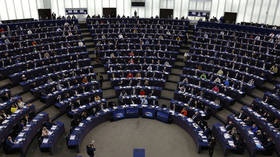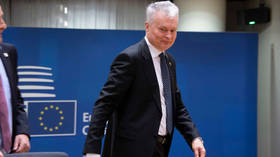EU Parliament approves total Russian energy ban

The European Parliament passed a resolution on Thursday demanding “an immediate full embargo on Russian imports of oil, coal, nuclear fuel and gas.” The bloc’s legislature also demanded Russia be completely cut off from the SWIFT banking network and booted from international organizations.
The resolution, which is not legally binding and only advisory in nature, passed by 513 votes to 22 and 19 abstentions. The total embargo on Russian energy that it demands goes well beyond the EU’s existing plan to reduce its reliance on Russian gas by two thirds before the end of the year, and to phase out Russian fossil fuels before 2030.
Such a move could have significant consequences across Europe. Russia supplies around 40% of the EU’s imported gas and 27% of its oil. Some countries are even more heavily reliant on Russian energy, with more than half of Germany’s gas and a third of its oil coming from Russia. While German Chancellor Olaf Scholz has expressed reticence at Russian President Vladimir Putin’s demand for paying for Russian gas with rubles, Foreign Minister Annalena Baerbock has warned that cutting off this vital energy source would grind the economy of Germany - Europe’s industrial powerhouse - to a halt.
For some gas- and oil-dependent countries, the parliament’s vote is likely to be ignored. In Hungary for example, Prime Minister Viktor Orban has stated that he will continue to buy Russian gas, and will pay for it in rubles. Budapest counts on Russia to deliver all of its gas, and Orban himself has declared an embargo “out of the question.”
Other countries have told their citizens to brace for energy rationing and sharp increases in the cost of living. So too has US President Joe Biden, who said during a visit last month that “eliminating Russian gas will have costs for Europe,” but “it’s not only the right thing to do from a moral standpoint… it's gonna put us on a much stronger strategic footing.”
American Liquefied Natural Gas (LNG), a more expensive fuel that must be transported by ship to special delivery terminals, could alleviate a percentage of the continent’s demands.
Thursday’s resolution also called for Russia to be expelled from the UN Human Rights Council, Interpol, the World Trade Organisation, UNESCO and other international organizations, and for all of the country’s banks to be removed from the SWIFT banking network.
In addition, it demanded that arms shipments to Ukraine “must continue and be stepped up.” While individual countries within the EU have funneled arms to the Ukrainian military, the bloc as a whole broke with tradition in February when foreign policy chief Josep Borrell announced that it would send nearly half a billion euros worth of “lethal aid” to Kiev.
Although Thursday’s resolution passed with overwhelming support, there was some dissent in the parliament. Irish MEP Clare Daly said that as a result of EU sanctions, “Russia is undeterred, while EU citizens face disastrous inflation, rocketing energy costs, and a historic decline in living standards.”













